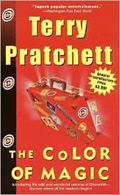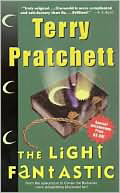

Note: These are books #19 and #20 in my 52 Books in 52 Weeks challenge for 2008.
Okay, Internet, I’ve got a bone to pick with you: how come none of you ever told me about Terry Pratchett?
Okay, so that’s not entirely fair. I’m pretty sure people have told me about Pratchett and his Diskworld series before, usually working in the phrase “He’s the Douglas Adams of fantasy” into the description. But the problem was that I always felt that I had had enough of Adams after the third Hithiker’s Guide to the Galaxy book, and whenever I scanned Pratchett’s section in the bookstore I was immediately put off by not knowing where to start reading among the approximately five hundred thousand Diskworld books. I’m glad I finally took the time to find out that these two books, The Colour of Magic and The Light Fantastic, jointly comprise the first tale in the series, and that they were definitely worth reading.
The Diskworld books are essentially satire of the high fantasy genre, or at least that’s the foundation upon which everything else is built. This pair of books follows the misadventures of Rincewind, a utterly inept and thoroughly cowardly wizard, and Twoflowers, a clueless traveler who happens to be in possession of both endless optimism and a magical suitcase that’s always wandering off and messily devouring people who get in its way. Things go from bad to worse for the two as divine powers both deliver them into and yank them out of all kinds of fantastic perils.
As someone who grew up reading plenty of this kind of thing and playing a lot of Dungeons& Dragons, I’m familiar enough with the genre and trappings that Pratchett lampoons. Yes, there’s the Conan parody, there’s the Dragonriders of Pern tribute, there’s the in-joke about Leiber’s Fafhrd and Gray Mouser. But that’s easy. The thing that made me almost immediately fall in love with these books is the author’s dry wit and his ability to derive humor not only from the absurdity of the story (and believe me, it gets plenty absurd) but also from just good old fashioned turns of phrase, wry commentary, and jokes. The guy just has an amazing ability to stuff five or six jokes into a single sentence, most of them making masterful use of that trusty standby of British humor, irony. It’s really smart and really funny, and the fact that it builds on the inherent silliness of the high fantasy genre is just icing.
I should also note how imaginative Pratchett is, which is a useful quality given his subject matter. He bounces his heroes from one (generally horrible and dangerous) situation to another at a frantic pace, and his ability to come up with new material and new situations amazes me. And while many of them are obvious parodies of fantasy staples, just as many seem to be wholly new creations. As one small (and obligatory) example, the Diskworld itself is a flat coin of a world that rides atop four enormous elephants, who themselves ride on the back of a colossal turtle with two continent-sized flippers that it uses to swim slowly through the cold reaches of space.
But at the same time, if I have one complaint about these first two books, it’s that they’re almost maniacal in their plotting. While it’s nice to see Pratchett’s considerable imagination and humor on display as we go from situation to situation, the first book reads like an extended doodle with little plot and a whole “gods playing games with mortals” subtext that’s entirely dropped in the next book. There’s also one Conan the Barbarian parody that’s abruptly dropped in favor of another Conan the Barbarian parody who Pratchett apparently liked better. It’s not until the latter part of the second book does an overall plot come into play, but honestly I was enjoying myself so much I really didn’t mind. Expect to see lots more Discworld books reviewed here in the future.
Others doing the 52-in-52 thing this week:
- Jeremy reviews DMZ
- Heliologue reviews Redwall and Mossflower by Brian Jacques
- Natasha reviews Good Masters! Sweet Ladies by Laura Amy Schlitz, and The Miraculous Journey of Edward Tulane by Kate DiCamillo,
I’ve always had the same problem, out of the hundred books I’d see on the shelves, I could never figure out where to star, and I didn’t feel like putting much effort into it. Maybe I’ll give the first one a shot.
To be honest, it doesn’t really matter where you start. Each of the books generally focuses on one, two or several of a main pantheon of characters but for the most part there’s no real follow-on in terms of plot. You can pretty much pick up any Discworld novel and read it without being too confused about who is who and so on.
One thing that may not have been apparent from these early novels is just how tightly plotted they tend to be.
Yeah, I can see Pratchett moving towards a tighter plot just in these two books. Heck, just within the last half of The Light Fantastic. Glad to hear the trend continues.